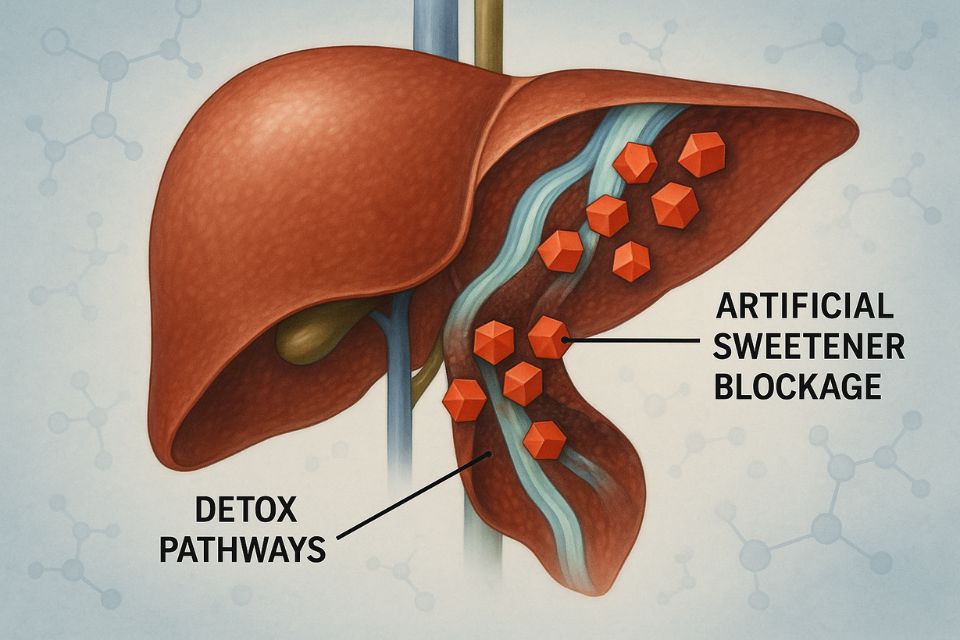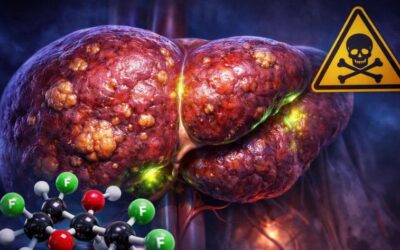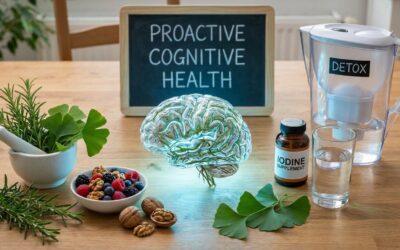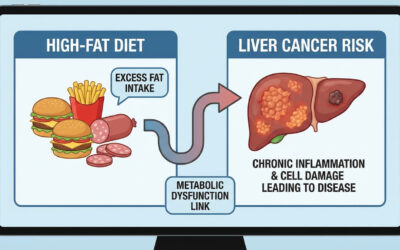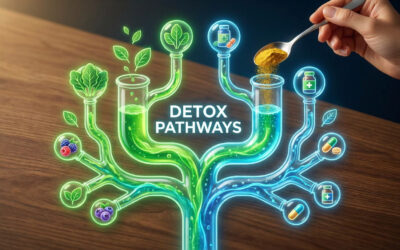Hidden behind those friendly “sugar-free” and “diet” labels is a sneaky culprit quietly sabotaging your liver’s natural detox powers—more than sugar ever could. Fresh research from 2025¹ uncovers how artificial sweeteners like aspartame and sucralose don’t just fool your taste buds—they actually interfere with your liver’s key detox hero, P-glycoprotein, a vital pathway most people don’t even know exists.
From diet sodas to “health” bars, these sweeteners are everywhere you look. Think diet sodas, soft drinks, fruit juices, frozen dairy desserts, and processed snacks packed with sucralose. Sugar alcohols also sneak in, found in goodies like chewing gum and baked treats.
Artificial sweeteners such as aspartame and sucralose fall into the category of high-intensity and nonnutritive sweeteners—they pack a punch of sweetness without the calories. Millions reach for these thinking they’re making a healthier choice, but the story inside your body is far more complicated. These sweeteners are commonly used to sweeten foods and drinks, providing sugar-free or diet options.
The Food and Drug Administration (FDA) plays a big role in approving these sweeteners, with FDA established acceptable daily intake levels for sucralose based on safety studies. Dietary guidelines offer advice on low-calorie sweetener use, especially for kids and sensitive groups. When you consume sucralose, only a tiny bit of absorbed sucralose passes through your digestive tract—the rest passes out mostly unchanged. Studies show sucralose and similar sweeteners aren’t broken down by enzymes in the upper gastrointestinal tract, which supports their safety profile.
The Hidden Danger of Artificial Sweeteners in Your Everyday Life
Unlike sugar, which hits you with obvious effects, artificial sweeteners are sneaky. They don’t scream for attention right away, making it easy to overlook the damage building quietly in your liver. A groundbreaking 2024 study found that sipping just one artificially sweetened drink a day more than doubles your risk of dying from chronic liver disease compared to those who drink them rarely.
In 2023, the World Health Organization sounded the alarm, advising against non-sugar sweeteners due to rising risks of heart disease and all-cause mortality. Yet, these sweeteners continue to flood thousands of products—from diet sodas to “healthy” protein bars—labeled as safe food additives approved for human consumption. Many of these are sweeteners approved by regulatory agencies such as the FDA and JECFA, which have set acceptable daily intake (ADI) levels after scientific evaluation.
What’s truly concerning is how these sweeteners disrupt your liver’s natural detox and healing by messing with P-glycoprotein. This disruption triggers a cascade of metabolic misfires. Some studies even link these additives to harmful effects, sparking heated debates about their long-term safety.
What is This Artificial Sweetener?
Sucralose is the superstar of artificial sweeteners, loved for sweetening without adding calories. It belongs to the category of high intensity sweeteners, which are significantly sweeter than sugar and used in small amounts. Sucralose is about 600 times sweeter than table sugar, so just a pinch goes a long way. You’ll spot it in diet sodas, artificially sweetened drinks, chewing gum, frozen desserts, and tons of processed foods designed for sugar-watchers.
Unlike natural sweeteners, sucralose is a man-made marvel—chemically tweaked by swapping three hydroxyl groups on the sucrose molecule with chlorine atoms. This makes it super sweet and tough for your body to break down, so most of it cruises through your digestive system untouched. It’s heat-stable too, making it a favorite for baked goods and cooked foods. But beware—heating sucralose above 120°C might create harmful compounds like chloropropanols. While sucralose metabolism in humans is limited, its popularity continues because it delivers sweetness without the calorie baggage. Plus, it doesn’t cause tooth decay or contribute to dental caries, making it a friend to your smile.
The Overlooked Safety Debate
Though sucralose is a go-to low-calorie sugar substitute, its safety story is still unfolding. The World Health Organization sets an acceptable daily intake (ADI) at 5 mg/kg body weight daily, but some new studies question if that’s truly protective. Regulatory agencies like the FDA, EFSA, and the Canadian Diabetes Association have established safety guidelines for consuming sucralose, focusing on maximum ADI levels and the body’s ability to absorb and eliminate it efficiently. Researchers have linked sucralose to weight gain, liver inflammation, and disruptions in glucose metabolism—outcomes that clash with the health halo often cast on sugar substitutes. It may even tweak insulin levels, influencing your metabolic health.
One eye-opener: sucralose might actually lead to eating more calories over time. Some evidence suggests it can throw off hunger signals and confuse your body’s sweet taste receptors, messing with how you regulate food intake and blood sugar. It might even shake up your gut microbiome and immune system, with ripple effects on overall health and disease control.
Given these red flags, health pros advise healthy adults to be mindful of sucralose intake, especially from processed foods and sweetened drinks. Keeping an eye on total sweetener consumption and respecting regulatory acceptable daily intakes can help keep risks in check. While sucralose can be a handy tool for weight and blood sugar management, its long-term effects on your liver, body weight, and overall wellness are still being explored. Multiple safety reviews say it’s generally safe at typical levels, and scientific studies on sucralose concluded that it is safe for consumption based on current evidence, but the debate isn’t over. Remember the old saccharin controversy? Early animal studies linked it to bladder cancer, but later research cleared it for human use, removing warning labels.
Chemistry and Production: How Artificial Sweeteners Are Made and Why It Matters
Artificial sweeteners like sucralose come from clever chemistry, transforming simple table sugar into a high-intensity sweetener through selective chlorination. This replaces three hydroxyl groups on sucrose with chlorine atoms, making it about 600 times sweeter. This tweak changes how your body handles the molecule—unlike natural sugars, sucralose resists breakdown, giving sweetness without calories.
How these sweeteners are made matters for safety and metabolism. The final product’s purity depends on strict manufacturing controls, since even tiny impurities can affect your body. The FDA keeps a close watch, but production can vary. Understanding the chemistry helps explain why artificial sweeteners act differently than natural sugars and why ongoing safety checks as food additives are so crucial.
How Does It Compare? Artificial Sweeteners vs. Table Sugar
The sweetener showdown is more relevant than ever. Sucralose offers sweetness without the calorie hit, making it popular for weight management. Table sugar, on the other hand, is linked to weight gain, dental problems, and blood sugar spikes. However, some studies suggest that artificial sweeteners like sucralose may alter the relationship between sweet taste and energy intake, potentially affecting appetite and total energy consumption.
The World Health Organization recommends keeping added sugars under 10% of daily energy to lower chronic disease risk. Excess sugar disrupts glucose metabolism and can sabotage healthy weight. Sucralose’s acceptable daily intake sits at 5 mg/kg body weight, giving clear safety guidance.
While sucralose is generally safe and effective, not all sugar substitutes are equal. Some affect metabolism or dental health differently. Choosing low-calorie sweeteners that don’t cause tooth decay can help manage weight and protect your smile—just stay within recommended limits.
The Molecular Sabotage and Inflammation Happening in Your Liver
P-glycoprotein disruption: your liver's security system fails
Artificial sweeteners block P-glycoprotein, a protein that acts like a molecular security guard in your liver cells. This protein normally identifies and expels toxins before they can cause damage. When artificial sweeteners disable this system, toxins accumulate, leading to inflammation and cellular damage that progresses silently over years.
Research shows this disruption affects not just liver function but also how your body processes medications, potentially making prescription drugs less effective or more toxic.
The supplement connection most doctors miss
Beyond artificial sweeteners, a 2024 JAMA study revealed that 4.7% of American adults regularly consume herbal supplements, thinking they are good for their health, containing liver-damaging botanicals like turmeric extract, green tea concentrate, and garcinia cambogia. These “natural” ingredients can cause acute liver injury, yet most consumers remain unaware of the risks.
Unlike traditional dietary patterns and metabolic health approaches that support liver function, these concentrated extracts overwhelm the organ’s processing capacity.
Sucralose Consumption and Metabolism: What Really Happens in Your Body?
After oral ingestion, sucralose travels through the digestive tract with only a small fraction being absorbed into the bloodstream. Most of the ingested sucralose is excreted unchanged in the feces, which is why it’s often considered a noncaloric sweetener. However, recent research has revealed that sucralose may not be as inert as once believed. Some studies suggest that sucralose can be metabolized by the gut microbiome, potentially leading to the formation of compounds that may have adverse health effects.
Heating sucralose, such as during baking or cooking, can result in the production of chloropropanols—chemicals that have been linked to negative health outcomes, including possible liver inflammation. Additionally, high levels of sucralose intake have been shown to alter the expression of genes involved in glucose metabolism, which could impact blood glucose levels and overall metabolic health. There is also evidence that sucralose may influence the immune system, raising concerns about its long-term effects on the human body.
While sucralose is approved for human consumption and is generally considered safe at recommended levels, these findings highlight the need for ongoing research into its effects on blood glucose, liver inflammation, and immune system function. As with any food additive, moderation and awareness of how your body responds are key to minimizing potential risks.
Impact on the Gastrointestinal Tract: The Gut-Liver Axis Under Attack
When you consume artificial sweeteners such as sucralose, your gastrointestinal tract is the first to encounter these compounds. Unlike natural sugars, which are readily digested and absorbed, artificial sweeteners can disrupt the delicate balance of your gut microbiota. Studies have shown that sucralose can reduce populations of beneficial bacteria, potentially leading to shifts in glucose metabolism and making weight management more challenging. These changes in the gut can have ripple effects throughout the body, particularly through the gut-liver axis—a vital communication network that links the digestive tract with the liver.
Disruption of the gut-liver axis by artificial sweeteners may impair the liver’s ability to regulate glucose homeostasis and detoxify harmful substances, increasing the risk of liver inflammation and other adverse health effects. Altered gut flora can also influence immune system function and contribute to metabolic imbalances, further complicating efforts to maintain healthy blood glucose levels and body weight. Understanding how artificial sweeteners impact the gastrointestinal tract and the gut-liver axis is crucial for anyone concerned about long-term health, especially when it comes to preventing liver-related complications.
Interactions with Other Substances: The Hidden Dangers in Your Diet
Artificial sweeteners like sucralose are rarely consumed in isolation. They often appear alongside other sugar substitutes, such as acesulfame potassium, in a wide variety of processed foods and beverages. This combination can amplify the risk of adverse health effects, including potential liver damage, especially when consumed in large quantities or over extended periods.
Moreover, sucralose may interact with certain medications, such as blood thinners, potentially altering their effectiveness or increasing the risk of side effects. The widespread use of artificial sweeteners in processed foods can also contribute to unhealthy eating habits, as these products often replace whole, nutrient-dense foods with low-calorie, artificially sweetened alternatives. Over time, this pattern may lead to weight gain and other health problems, undermining the intended benefits of using sugar substitutes.
To protect your health, it’s important to be mindful of the cumulative impact of artificial sweeteners and processed foods in your diet. Opting for whole foods and limiting the intake of sugar substitutes and artificial sweeteners can help you maintain balanced eating habits and reduce the risk of adverse health effects.
Acesulfame Potassium and Other Sweeteners: Are They Any Safer?
Acesulfame potassium, commonly known as Ace-K, is another artificial sweetener frequently found alongside sucralose in diet sodas, chewing gum, and other processed foods. Like sucralose, Ace-K is classified as a high-intensity sweetener and has been approved by regulatory agencies such as the FDA after extensive safety testing. However, not all artificial sweeteners are created equal. Some research has raised questions about Ace-K’s potential effects on thyroid function and its possible link to cancer risk, prompting ongoing debate among scientists and health professionals.
Each artificial sweetener—whether it’s sucralose, Ace-K, aspartame, or saccharin—has a unique chemical structure and is metabolized differently by the human body. These differences can influence their safety profiles and potential for adverse health effects. While regulatory agencies set guidelines for acceptable daily intake, new research continues to emerge, highlighting the importance of staying informed about the latest findings. For consumers and healthcare providers alike, comparing the risks and benefits of various artificial sweeteners is essential for making safe choices in a world where these food additives are increasingly common.
Spotting the Early Warning Signs
The tricky part about liver damage from these sneaky ingredients is that symptoms usually don’t show up until serious harm has already been done. But there are subtle clues to watch for: unexplained tiredness, trouble processing medications, ongoing digestive discomfort, or even feeling off when you drink alcohol or caffeine.
If you’re regularly consuming artificial sweeteners or herbal supplements, getting your liver enzymes checked—like AST and ALT—can be a lifesaver. These tests can catch liver stress early, before it turns into something irreversible.
Individual Variability: Why Some People Suffer More Than Others
Not everyone reacts to artificial sweeteners in the same way. Individual variability plays a major role in how substances like sucralose affect glucose metabolism, weight management, and the immune system. Factors such as genetics, the composition of your gut microbiota, and the health of your liver can all influence your body’s response to artificial sweeteners. For example, people with pre-existing conditions like diabetes or obesity may be more sensitive to disruptions in glucose metabolism, potentially experiencing more pronounced adverse effects.
Additionally, differences in immune system function and overall health status can make some individuals more vulnerable to the negative impacts of artificial sweeteners. This variability underscores the importance of personalized nutrition and the need for healthcare professionals to tailor their advice based on each person’s unique physiology and risk factors. If you notice changes in your health after consuming artificial sweeteners, it may be a sign that your body is more susceptible to their effects, and adjusting your intake could be beneficial for your long-term well-being.
Dose-Response Relationships: How Much Is Too Much?
Understanding how much artificial sweetener is safe to consume is a complex issue. Regulatory agencies have established acceptable daily intake (ADI) levels for substances like sucralose, typically expressed in milligrams per kilogram of body weight. These guidelines are designed to protect the general population from adverse effects, but individual tolerance can vary widely. Some people may experience negative reactions even at levels below the ADI, especially if they are consuming multiple types of artificial sweeteners across different products.
The cumulative impact of sweetener intake from various sources—such as diet soda, artificially sweetened beverages, and processed foods—can be difficult to track, raising concerns about exceeding safe limits. Studies often compare artificially sweetened beverages to sugar sweetened beverage consumption, emphasizing that sugar sweetened beverages can significantly increase calorie intake and contribute to weight gain, particularly in children and adolescents. Moreover, the long-term effects of chronic exposure to low-calorie sweeteners are still being studied, and new research may prompt updates to dietary guidelines in the future. To minimize health risks, it’s wise to be mindful of your total sweetener intake, stay informed about acceptable daily intakes, and consult with healthcare professionals if you have concerns about adverse effects or your individual response to these food additives.
What the Science Says: Epidemiological Studies on Artificial Sweeteners and Liver Health
The relationship between artificial sweetener intake and liver health has been the subject of numerous epidemiological studies, but the findings remain mixed. Some research indicates that high consumption of artificial sweeteners, particularly through artificially sweetened beverages like diet soda, may be associated with an increased risk of liver disease, including non-alcoholic fatty liver disease (NAFLD). These studies suggest that frequent sweetener intake could contribute to liver stress, especially when combined with other dietary and lifestyle factors.
However, not all studies agree. A comprehensive review of 17 epidemiological studies published in 2020 found inconsistent evidence regarding the link between artificial sweeteners and liver health. Some studies reported no significant association between sweetener intake and liver disease, highlighting the complexity of isolating the effects of artificial sweeteners from other variables in the diet.
Despite these uncertainties, the potential connection between artificially sweetened beverages and liver health underscores the importance of moderation and ongoing research. As new evidence emerges, it will be crucial for both consumers and healthcare professionals to stay informed about the latest findings on artificial sweeteners and their impact on liver health.
Protecting yourself from hidden liver threats
Immediate dietary changes and acceptable daily intake awareness
Replace artificially sweetened products with naturally flavored alternatives. Water infused with fresh fruits provides sweetness without the liver-damaging compounds. Swap the artificial sweet treats with seasonal organic fruits. Emphasize a diet rich in whole, unprocessed foods, especially the ones listed in the Accelerated Food Guide to lighten the load on your liver and promote its healing.
Empower your liver with targeted, natural support
To truly protect and restore your liver health, it’s essential to focus on real, whole foods and avoid anything artificial or processed that can burden your liver. Complementing a clean diet with scientifically formulated supplements can dramatically enhance your liver’s detoxification and regenerative capacity. The trio of Accelerated Liver Care, Acceleradine Iodine, and Accelerated Cellular Detox® Powder offers comprehensive support by targeting key pathways and providing essential nutrients your liver needs.
Accelerated Liver Care®: Premium liver regeneration and detox support
The formula in Accelerated Liver Care® is in a category of its own.
Most liver support supplements rely on dried-out herbs that are lifeless, low-potency, or worse—loaded with sulfur or oxalates that clog the very liver they’re meant to support. This blend is different. It’s clean, vibrant, and made from 13 carefully sourced botanicals that truly support liver regeneration, bile flow, and toxin clearance.
Let me walk you through each one:
- Kukti – A warming liver stimulant that boosts circulation and helps move bile, so your body can eliminate what it’s ready to let go of.
- Phyllanthus – Known for its liver-protective properties, especially for chronic viral and chemical liver stress. It helps rebuild liver tissue from the inside out.
- TUDCA – A bile acid that supports bile flow, fat digestion, and liver detoxification at a deep level. One of the most powerful liver helpers we have.
- Eclipta – Calms liver heat and inflammation. Think of this one when you’re dealing with irritability, acne, or hormonal congestion.
- Jin Qian Cao – Amazing for breaking up liver and gallstones, and gently improving bile fluidity.
- Bupleurum – The classic herb in Chinese medicine for stuck liver qi. Helps regulate hormones, detox emotions, and support detox on all levels—physical and emotional.
- Milk Thistle – We all know this one. It’s here because it works. Rich in silymarin, it protects and repairs liver cells damaged by medications, alcohol, or toxins.
- Pau Pereira – A lesser-known rainforest botanical that actually supports the destruction of damaged or abnormal cells while supporting detox immunity.
- Thai Black Ginger – Helps your liver metabolize fats better, improves insulin sensitivity, and boosts circulation.
- Skullcap – A calming herb that supports the nervous system and works hand-in-hand with the liver, especially when you’re feeling overstimulated or stressed.
- Andrographis – A bitter, antimicrobial herb that clears heat, supports the immune system, and promotes detox from pathogens and inflammation.
- Artemisia capillaris – Great for clearing ammonia, cooling inflammation, and supporting liver energy—especially in chemical overload or heat states.
This is what I take daily for prevention and increase the dose when I feel heavy, sluggish, or toxic—and it’s what I recommend when someone’s liver has been overwhelmed by meds, mold, alcohol, hormone imbalances, or decades of exposure.
Accelerated Cellular Detox® Powder: Deep cellular cleansing and toxin binding
This is the cleanup crew. You can support the liver all day long, but if you don’t bind and remove the junk that’s being released, it just recirculates—and that’s when you feel worse. Headaches, fatigue, skin breakouts, bloating—those are all signs the toxins are being stirred up but not escorted out.
The Accelerated Cellular detox® formula binds toxins at the gut level—gently, safely, and without pushing or depleting. I take it every night before bed.
Here’s what’s inside:
- Micronized Zeolite – A mineral with a negative charge that pulls out heavy metals, radioactive particles, glyphosate, and even ammonia. Because it’s micronized, it can get into more places and do a deeper job.
- Human-grade Diatomaceous Earth – This is silica-rich and helps scrub the intestinal wall, pulling out parasites, fungal toxins, and biofilm. Plus, it supports skin, hair, nails, and connective tissue.
- Activated Charcoal – One of the best binders we have for mold toxins, VOCs, and chemical residues. It calms gas, bloating, and histamine flare-ups, too.
- Organic Triphala – This is the gentle digestive regulator. Not a laxative, but a gut toner that keeps things moving without stress or dependency.
- Organic Slippery Elm Bark – A soothing mucilage that helps repair the gut lining, calm inflammation, and protect from irritation.
- Chitosan – A marine fiber that binds fat-soluble toxins and cholesterol, while helping maintain microbial balance in the colon.
I like to mix this with water (sometimes lemon or Apple Cider Vinegar) and sip it before bed. It pulls out what your body has worked hard to detox during the day—and makes sure it doesn’t get reabsorbed overnight.
Acceleradine® Iodine: Pure, bioavailable iodine for detox and energy
This is not just iodine. It’s a pure, monoatomic form that’s scalar-charged for optimal cellular absorption. It’s what I use personally to displace fluoride, chlorine, and bromide—because those toxic halogens block your thyroid, lower your energy, and interrupt your hormone balance.
This is what’s in it:
- 2% atomic iodine (I⁻) – Delivered in organic non-GMO grain alcohol. There’s no glycerin, no alcohol from petroleum, and no synthetic additives. Just clean, absorbable iodine from South America untouched by modern man that your body can use immediately.
- Scalar frequency enhancement – Each batch is infused with frequency and light energy to improve detox potential, cellular function, and energy transmission.
It helps with:
- Detoxing fluoride, bromide, chlorine
- Boosting thyroid hormone production
- Supporting immune response and antiviral defense
- Fueling ATP production for cellular energy
- Promoting mental clarity, warmth, and metabolic balance
Iodine is also critical for hormone production, reproductive health, breast and prostate tissue, and pineal gland decalcification. Most people—especially women—are chronically deficient, and it’s no wonder. Our food is grown in iodine-depleted soil, and we’re swimming in halogens every day.
The Synergy
These three work together beautifully.
- Acceleradine® Iodine reboots thyroid function, removes toxic halogens, and restores cellular energy.
- Accelerated Liver Care® regenerates and supports liver function so toxins actually move out.
- Accelerated Cellular Detox Powder® binds and removes the waste so you feel better—not worse—during detox.
There’s no sulfur, no oxalates, no fillers. Just clean, effective ingredients your body recognizes and can actually use. Whether you’re dealing with mold, meds, hormone imbalances, or just modern life—this is how you support your detox system the right way.
Every day. Gently. Consistently. And without compromise.
Public Health Implications: Why This Matters for Everyone
The widespread use of artificial sweeteners in processed foods and beverages has far-reaching public health implications. As rates of obesity, diabetes, and liver disease continue to rise, understanding the role of artificial sweeteners in weight management and overall health is more important than ever. While these sugar substitutes can be a helpful tool for reducing calorie intake and managing body weight, they should not be viewed as a cure-all.
The FDA has established acceptable daily intakes for artificial sweeteners, including sucralose, to help ensure safe consumption. However, relying too heavily on processed foods and artificially sweetened products can lead to imbalanced eating habits and may increase the risk of chronic disease. Certain dietary patterns, especially those high in processed foods and artificial sweeteners, have also been associated with increased body weight in some studies. A balanced diet that emphasizes whole, minimally processed foods, combined with regular physical activity, remains the cornerstone of good health.
By staying informed about the potential risks and benefits of artificial sweeteners, following dietary guidelines, and being mindful of acceptable daily intakes, individuals can make choices that support both their liver health and long-term well-being. Ultimately, the key to effective weight management and disease prevention lies in a holistic approach to nutrition and lifestyle—not just in swapping sugar for its artificial counterparts.
Your liver's future and weight gain depend on today's choices
The liver’s remarkable ability to regenerate makes recovery possible when harmful exposures are eliminated early. By recognizing artificial sweeteners and unregulated supplements as the hidden threats they are, and by focusing on whole foods and trusted liver-support tools like Accelerated Liver Care, Acceleradine Iodine, and Accelerated Cellular Detox Powder, you can make informed decisions that protect this vital organ. Your liver processes over 500 functions daily—it deserves protection from these silent saboteurs masquerading as healthy alternatives.
1. Ni-ren Li, Yi-xuan Zeng, Yu-feng Gu, Pai Xie, Bing-ying Deng, Si-fan Lu, Wang-an Li, Yi Liu, Aspartame increases the risk of liver cancer through CASP1 protein: A comprehensive network analysis insights, Ecotoxicology and Environmental Safety, Volume 294, 2025, 118089, ISSN 0147-6513,
https://doi.org/10.1016/j.ecoenv.2025.118089.(https://www.sciencedirect.com/science/article/pii/S0147651325004257)
Sara Banta
Sara Banta is a Stanford University Graduate with a Degree in Economics and Psychology, and a certified Natural Supplement Expert & Graduate of the Institute for Integrative Nutrition. Sara is the Founder of Accelerated Health Products and host of the health & wellness podcast, Accelerated Health Radio.
- Sara Banta
- Sara Banta
- Sara Banta
- Sara Banta
- Sara Banta
- Sara Banta
- Sara Banta
- Sara Banta
- Sara Banta
- Sara Banta
- Sara Banta
- Sara Banta
- Sara Banta
- Sara Banta
- Sara Banta
- Sara Banta
- Sara Banta
- Sara Banta
- Sara Banta
- Sara Banta
- Sara Banta
- Sara Banta
- Sara Banta
- Sara Banta
- Sara Banta
- Sara Banta
- Sara Banta
- Sara Banta
- Sara Banta
- Sara Banta
- Sara Banta
- Sara Banta
- Sara Banta
- Sara Banta
- Sara Banta
- Sara Banta
- Sara Banta
- Sara Banta
- Sara Banta
- Sara Banta
- Sara Banta
- Sara Banta
- Sara Banta
- Sara Banta
- Sara Banta
- Sara Banta
- Sara Banta
- Sara Banta
- Sara Banta
- Sara Banta
- Sara Banta
- Sara Banta
- Sara Banta
- Sara Banta
- Sara Banta
- Sara Banta
- Sara Banta
- Sara Banta
- Sara Banta
- Sara Banta
- Sara Banta
- Sara Banta
- Sara Banta
- Sara Banta
- Sara Banta
- Sara Banta
- Sara Banta
- Sara Banta
- Sara Banta
- Sara Banta
- Sara Banta
- Sara Banta
- Sara Banta
- Sara Banta
- Sara Banta
- Sara Banta
- Sara Banta
- Sara Banta
- Sara Banta
- Sara Banta
- Sara Banta
- Sara Banta
- Sara Banta
- Sara Banta
- Sara Banta
- Sara Banta
- Sara Banta
- Sara Banta
- Sara Banta
- Sara Banta
- Sara Banta
- Sara Banta
- Sara Banta
- Sara Banta
- Sara Banta
- Sara Banta
- Sara Banta
- Sara Banta
- Sara Banta
- Sara Banta
- Sara Banta
- Sara Banta
- Sara Banta
- Sara Banta
- Sara Banta
- Sara Banta
- Sara Banta
- Sara Banta
- Sara Banta
- Sara Banta
- Sara Banta
- Sara Banta
- Sara Banta
- Sara Banta
- Sara Banta
- Sara Banta
- Sara Banta
- Sara Banta
- Sara Banta
- Sara Banta
- Sara Banta
- Sara Banta
- Sara Banta
- Sara Banta
- Sara Banta
- Sara Banta
- Sara Banta
- Sara Banta
- Sara Banta
- Sara Banta
- Sara Banta
- Sara Banta
- Sara Banta
- Sara Banta
- Sara Banta
- Sara Banta
- Sara Banta
- Sara Banta
- Sara Banta
- Sara Banta
- Sara Banta
- Sara Banta
- Sara Banta
- Sara Banta
- Sara Banta
- Sara Banta
- Sara Banta
- Sara Banta
- Sara Banta
- Sara Banta
- Sara Banta
- Sara Banta
- Sara Banta
- Sara Banta
- Sara Banta
- Sara Banta
- Sara Banta
- Sara Banta
- Sara Banta
- Sara Banta
- Sara Banta
- Sara Banta
- Sara Banta
- Sara Banta
- Sara Banta
- Sara Banta
- Sara Banta
- Sara Banta
- Sara Banta
- Sara Banta
- Sara Banta
- Sara Banta
- Sara Banta
- Sara Banta
- Sara Banta
- Sara Banta
- Sara Banta
- Sara Banta
- Sara Banta
- Sara Banta
- Sara Banta
- Sara Banta
- Sara Banta
- Sara Banta
- Sara Banta
- Sara Banta
- Sara Banta
- Sara Banta
- Sara Banta
- Sara Banta
- Sara Banta
- Sara Banta
- Sara Banta
- Sara Banta
- Sara Banta
- Sara Banta
- Sara Banta
- Sara Banta
- Sara Banta
- Sara Banta
- Sara Banta
- Sara Banta
- Sara Banta
- Sara Banta
- Sara Banta
- Sara Banta
- Sara Banta
- Sara Banta
- Sara Banta
- Sara Banta
- Sara Banta
- Sara Banta
- Sara Banta
- Sara Banta
- Sara Banta
- Sara Banta
- Sara Banta
- Sara Banta

